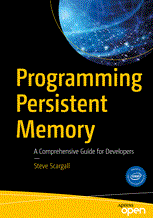
|
FreeComputerBooks.com
Links to Free Computer, Mathematics, Technical Books all over the World
|
|
- Title: Programming Persistent Memory: A Comprehensive Guide for Developers
- Author(s) Steve Scargall
- Publisher: Apress; 1st ed. edition (January 10, 2020); eBook (Creative Commons Licensed)
- License(s): CC BY 4.0
- Paperback: 472 pages
- eBook: PDF (457 pages) and ePub
- Language: English
- ISBN-10: 1484249313
- ISBN-13: 978-1484249314
- Share This:

|
This book describes the Persistent Memory technology and why it is exciting the industry. It covers the operating system and hardware requirements as well as how to create development environments using emulated or real persistent memory hardware.
It explains fundamental concepts; provides an introduction to persistent memory programming APIs for C, C++, JavaScript, and other languages; discusses RMDA with persistent memory; reviews security features; and presents many examples. Source code and examples that you can run on your own systems are included.
About the Authors- Steve Scargall is a persistent memory software/cloud architect within Intel's Data Center Group (DCG).
- Computer Programming
- Operating Systems (OS) Design and Construction
- JavaScript Programming
- C++ Programming
- Advanced Java Programming

- Programming Persistent Memory: A Comprehensive Guide for Developers (Steve Scargall)
- The Mirror Site (1) - PDF
- Source Code for the Book
-
 What Every Programmer Should Know About Memory
What Every Programmer Should Know About Memory
This document explains the structure of memory subsystems in use on modern commodity hardware, illustrating why CPU caches were developed, how they work, and what programs should do to achieve optimal performance by utilizing them.
-
 How Computers Work: Processor and Main Memory, 2nd Edition
How Computers Work: Processor and Main Memory, 2nd Edition
This book starts out very simple and gets more complex as it goes along, but everything is explained. The processor and memory are mainly covered. It explains in great detail the operation of a simple but functional computer.
-
 Pointers and Memory (Nick Parlante, et al.)
Pointers and Memory (Nick Parlante, et al.)
This is an introduction to programming with pointers and memory in C, C++ and other languages. Explains how pointers and memory work and how to use them -- from the basic concepts through all the major programming techniques.
-
 The Java Garbage Collection Mini-Book (Charles Humble)
The Java Garbage Collection Mini-Book (Charles Humble)
This book provides a concise, accessible guide for Java architects and senior developers who want to understand what garbage collection is, how it works, and how it impacts the execution of their programs.
-
 Memory Management: Algorithms and Implementations in C/C++
Memory Management: Algorithms and Implementations in C/C++
This book presents several concrete implementations of garbage collection and explicit memory management algorithms. Find out how memory is managed at the hardware level by the processor.
-
 Small Memory Software: Systems with Limited Memory
Small Memory Software: Systems with Limited Memory
This book provides practical help for programmers developing software for limited memory-capacity environments. It consists of a series of patterns developed by the authors based on solutions which have been found to work in real-life situations.
-
 Programming Memory-Constrained Networked Embedded Systems
Programming Memory-Constrained Networked Embedded Systems
This book focus on three topics regarding programming memory-constrained networked embedded systems: the TCP/IP, simplifying event-driven, and dynamic loading for memory-constrained systems.
-
 Under the Hood of .NET Memory Management (Chris Farrell)
Under the Hood of .NET Memory Management (Chris Farrell)
This book covers theory and practice for analyzing and improving .NET code performance, with examples and tips, starting with the core concepts of .NET memory management and garbage collection, then additional details and intricacies.
-
 Foundations of Machine Learning (Mehryar Mohri, et al)
Foundations of Machine Learning (Mehryar Mohri, et al)
This book is a general introduction to machine learning. It covers fundamental modern topics in machine learning while providing the theoretical basis and conceptual tools needed for the discussion and justification of algorithms.





